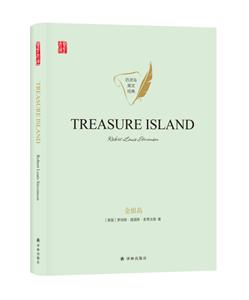
作者:罗伯特·路易斯·史蒂文森
页数:248
出版社:译林出版社
出版日期:2020
ISBN:9787544783491
电子书格式:pdf/epub/txt
内容简介
《金银岛》为纯英文版,是英国作家罗伯特·路易斯·史蒂文森创作的一部冒险小说。小说通过少年吉姆·霍金斯的经历,讲述了一个惊险曲折的冒险故事。为了夺取老海盗弗林特藏在金银岛上的财宝,吉姆他们通过自己的勇敢和机智与海盗们周旋,经历了九死一生的激烈战斗,最终挫败了海盗们的阴谋,得到了宝藏。这部小说开创了探宝小说的先河,情节曲折,悬念迭起,成为世界儿童文学史上的经典之作。
作者简介
罗伯特·路易斯·史蒂文森(Robert Louis Stevenson,1850—1894), 英国著名小说家、诗人,19世纪英国文坛新浪漫主义文学的奠基者和杰出代表。他出生于苏格兰的爱丁堡,从小爱好文学,富于幻想;成年后,放弃了律师职业,专门从事写作。史蒂文森很早就染上结核病,一生与海绝缘,可是他却创作了许多与海盗和冒险有关的小说,此外另有多部游记。代表作有《金银岛》《化身博士》《内河航程》等。
本书特色
浩瀚的大海荒凉的孤岛深埋的财宝一场邪恶与正义的较量一幕人性与欲望的斗争世界儿童文学史上的经典之作开创了探宝小说的先河精装纯英文适合收藏
目录
PART ONEThe Old Buccaneer
1The Old Sea-Dog at the Admiral Benbow… 3
2Black Dog Appears and Disappears 10
3The Black Spot 17
4The Sea-Chest.. 24
5The Last of the Blind Man… 31
6The Captain’s Papers 37
PART TWOThe SeaCook
7I Go to Bristol.. 47
8At the Sign of the Spy-Glass 53
9Powder and Arms 59
10The Voyage 65
11What I Heard in the Apple Barrel.. 71
12Council of War… 78
PART THREEMy Shore Adventure
13How I Began My Shore Adventure 87
14The First Blow… 93
15The Man of the Island 99
PART FOURThe Stockade
16Narrative Continued by the Doctor:
How the Ship Was Abandoned.. 109
17Narrative Continued by the Doctor:
The Jolly-Boat’s Last Trip 115
18Narrative Continued by the Doctor:
End of the First Day’s Fighting 120
19Narrative Resumed by Jim Hawkins:
The Garrison in the Stockade 125
20Silver’s Embassy 131
21The Attack 137
PART FIVEMy Sea Adventure
22How I Began My Sea Adventure… 147
23The Ebb-Tide Runs 154
24The Cruise of the Coracle 159
25I Strike the Jolly Roger.. 165
26Israel Hands… 171
27“Pieces of Eight” 180
PART SIXCaptain Silver
28In the Enemy’s Camp 189
29The Black Spot Again 197
30On Parole… 204
31The Treasure Hunt—Flint’s Pointer… 212
32The Treasure Hunt—the Voice Among the Trees 219
33The Fall of a Chieftain… 226
34And Last 233
节选
1 The Old Sea-Dog at the Admiral Benbow
Squire Trelawney, Dr. Livesey, and the rest of these gentlemen having asked me to write down the whole particulars about Treasure Island, from the beginning to the end, keeping nothing back but the bearings of the island, and that only because there is still treasure not yet lifted, I take up my pen in the year of grace 17—, and go back to the time when my father kept the Admiral Benbow inn and the brown old seaman with the sabre cut first took up his lodging under our roof.
I remember him as if it were yesterday, as he came plodding to the inn door, his sea-chest following behind him in a handbarrow—a tall, strong, heavy, nut-brown man, his tarry pigtail falling over the shoulders of his soiled blue coat, his hands ragged and scarred, with black, broken nails; and the sabre cut across one cheek, a dirty, livid white. I remember him looking round the cover and whistling to himself as he did so, and then breaking out in that old sea-song that he sang so often afterwards: Fifteen men on the dead man’s chest—
Yo-ho-ho, and a bottle of rum! in the high, old tottering voice that seemed to have been tuned and broken at the capstan bars. Then he rapped on the door with a bit of stick like a handspike that he carried, and when my father appeared, called roughly for a glass of rum. This, when it was brought to him, he drank slowly, like a connoisseur, lingering on the taste and still looking about him at the cliffs and up at our signboard.
“This is a handy cove,” says he, at length; “and a pleasant sittyated grog-shop. Much company, mate?”
My father told him no, very little company, the more was the pity.
“Well, then,” said he, “this is the berth for me. Here you, matey,” he cried to the man who trundled the barrow; “bring up alongside and help up my chest. I’ll stay here a bit,” he continued. “I’m a plain man; rum and bacon and eggs is what I want, and that head up there for to watch ships off. What you mought call me? You mought call me captain. Oh, I see what you’re at—there”; and he threw down three or four gold pieces on the threshold. “You can tell me when I’ve worked through that,” says he, looking as fierce as a commander.
And, indeed, bad as his clothes were and coarsely as he spoke, he had none of the appearance of a man who sailed before the mast; but seemed like a mate or skipper accustomed to be obeyed or to strike. The man who came with the barrow told us the mail had set him down the morning before at the Royal George, that he had inquired what inns there were along the coast, and hearing ours well spoken of, I suppose, and described as lonely, had chosen it from the others for his place of residence. And that was all we could learn of our guest.















